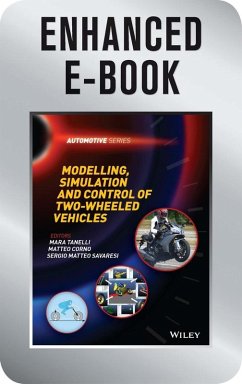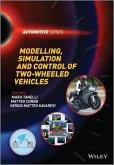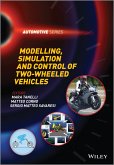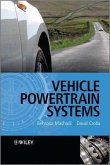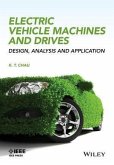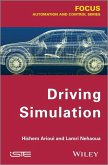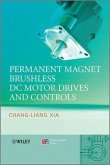Modelling, Simulation and Control of Two-Wheeled Vehicles, Enhanced Edition (eBook, ePUB)


Alle Infos zum eBook verschenken

Modelling, Simulation and Control of Two-Wheeled Vehicles, Enhanced Edition (eBook, ePUB)
- Format: ePub
- Merkliste
- Auf die Merkliste
- Bewerten Bewerten
- Teilen
- Produkt teilen
- Produkterinnerung
- Produkterinnerung

Hier können Sie sich einloggen

Bitte loggen Sie sich zunächst in Ihr Kundenkonto ein oder registrieren Sie sich bei bücher.de, um das eBook-Abo tolino select nutzen zu können.
Enhanced e-book includes videos Many books have been written on modelling, simulation and control of four-wheeled vehicles (cars, in particular). However, due to the very specific and different dynamics of two-wheeled vehicles, it is very difficult to reuse previous knowledge gained on cars for two-wheeled vehicles. Modelling, Simulation and Control of Two-Wheeled Vehicles presents all of the unique features of two-wheeled vehicles, comprehensively covering the main methods, tools and approaches to address the modelling, simulation and control design issues. With contributions from leading…mehr
- Geräte: eReader
- mit Kopierschutz
- eBook Hilfe
- Größe: 65.02MB
![Modelling, Simulation and Control of Two-Wheeled Vehicles (eBook, ePUB) Modelling, Simulation and Control of Two-Wheeled Vehicles (eBook, ePUB)]() Mara TanelliModelling, Simulation and Control of Two-Wheeled Vehicles (eBook, ePUB)123,99 €
Mara TanelliModelling, Simulation and Control of Two-Wheeled Vehicles (eBook, ePUB)123,99 €![Modelling, Simulation and Control of Two-Wheeled Vehicles (eBook, PDF) Modelling, Simulation and Control of Two-Wheeled Vehicles (eBook, PDF)]() Mara TanelliModelling, Simulation and Control of Two-Wheeled Vehicles (eBook, PDF)123,99 €
Mara TanelliModelling, Simulation and Control of Two-Wheeled Vehicles (eBook, PDF)123,99 €![Vehicle Powertrain Systems (eBook, ePUB) Vehicle Powertrain Systems (eBook, ePUB)]() David CrollaVehicle Powertrain Systems (eBook, ePUB)87,99 €
David CrollaVehicle Powertrain Systems (eBook, ePUB)87,99 €![Electric Vehicle Machines and Drives (eBook, ePUB) Electric Vehicle Machines and Drives (eBook, ePUB)]() K. T. ChauElectric Vehicle Machines and Drives (eBook, ePUB)123,99 €
K. T. ChauElectric Vehicle Machines and Drives (eBook, ePUB)123,99 €![Driving Simulation (eBook, ePUB) Driving Simulation (eBook, ePUB)]() Hichem AriouiDriving Simulation (eBook, ePUB)139,99 €
Hichem AriouiDriving Simulation (eBook, ePUB)139,99 €![Permanent Magnet Brushless DC Motor Drives and Controls (eBook, ePUB) Permanent Magnet Brushless DC Motor Drives and Controls (eBook, ePUB)]() Chang-Liang XiaPermanent Magnet Brushless DC Motor Drives and Controls (eBook, ePUB)128,99 €
Chang-Liang XiaPermanent Magnet Brushless DC Motor Drives and Controls (eBook, ePUB)128,99 €![Optimization in Engineering Sciences (eBook, ePUB) Optimization in Engineering Sciences (eBook, ePUB)]() Pierre BorneOptimization in Engineering Sciences (eBook, ePUB)140,99 €
Pierre BorneOptimization in Engineering Sciences (eBook, ePUB)140,99 €-
-
-
Dieser Download kann aus rechtlichen Gründen nur mit Rechnungsadresse in A, B, BG, CY, CZ, D, DK, EW, E, FIN, F, GR, HR, H, IRL, I, LT, L, LR, M, NL, PL, P, R, S, SLO, SK ausgeliefert werden.
- Produktdetails
- Verlag: John Wiley & Sons
- Seitenzahl: 368
- Erscheinungstermin: 23. April 2014
- Englisch
- ISBN-13: 9781118802892
- Artikelnr.: 41090595
- Verlag: John Wiley & Sons
- Seitenzahl: 368
- Erscheinungstermin: 23. April 2014
- Englisch
- ISBN-13: 9781118802892
- Artikelnr.: 41090595
- Herstellerkennzeichnung Die Herstellerinformationen sind derzeit nicht verfügbar.
List of Contributors xiii
Series Preface xv
Introduction xvii
Part One TWO-WHEELED VEHICLES MODELLING AND SIMULATION
1 Motorcycle Dynamics 3
Vittore Cossalter, Roberto Lot, and Matteo Massaro
1.1 Kinematics 3
1.2 Tyres 6
1.3 Suspensions 13
1.4 In-Plane Dynamics 18
1.5 Out-of-Plane Dynamics 29
1.6 In-Plane and Out-of-Plane Coupled Dynamics 40
References 41
2 Dynamic Modelling of Riderless Motorcycles for Agile Manoeuvres 43
Yizhai Zhang, Jingang Yi, and Dezhen Song
2.1 Introduction 43
2.2 Related Work 44
2.3 Motorcycle Dynamics 45
2.4 Tyre Dynamics Models 51
2.5 Conclusions 55
Nomenclature 55
Appendix A: Calculation of Ms 56
Appendix B: Calculation of Acceleration ¿G 57
Acknowledgements 57
References 57
3 Identification and Analysis of Motorcycle Engine-to-Slip Dynamics 59
Matteo Corno and Sergio M. Savaresi
3.1 Introduction 59
3.2 Experimental Setup 60
3.3 Identification of Engine-to-Slip Dynamics 61
3.4 Engine-to-Slip Dynamics Analysis 73
3.5 Road Surface Sensitivity 78
3.6 Velocity Sensitivity 79
3.7 Conclusions 80
References 80
4 Virtual Rider Design: Optimal Manoeuvre Definition and Tracking 83
Alessandro Saccon, John Hauser, and Alessandro Beghi
4.1 Introduction 83
4.2 Principles of Minimum Time Trajectory Computation 86
4.3 Computing the Optimal Velocity Profile for a Point-Mass Motorcycle 90
4.4 The Virtual Rider 102
4.5 Dynamic Inversion: from Flatland to State-Input Trajectories 103
4.6 Closed-Loop Control: Executing the Planned Trajectory 107
4.7 Conclusions 115
4.8 Acknowledgements 116
References 116
5 The Optimal Manoeuvre 119
Francesco Biral, Enrico Bertolazzi, and Mauro Da Lio
5.1 The Optimal Manoeuvre Concept: Manoeuvrability and Handling 121
5.2 Optimal Manoeuvre as a Solution of an Optimal Control Problem 133
5.3 Applications of Optimal Manoeuvre to Motorcycle Dynamics 145
5.4 Conclusions 152
References 152
6 Active Biomechanical Rider Model for Motorcycle Simulation 155
Valentin Keppler
6.1 Human Biomechanics and Motor Control 156
6.2 The Model 161
6.3 Simulations and Results 167
6.4 Conclusions 179
References 180
7 A Virtual-Reality Framework for the Hardware-in-the-Loop Motorcycle
Simulation 183
Roberto Lot and Vittore Cossalter
7.1 Introduction 183
7.2 Architecture of the Motorcycle Simulator 184
7.3 Tuning and Validation 188
7.4 Application Examples 191
References 194
Part Two TWO-WHEELED VEHICLES CONTROL AND ESTIMATION PROBLEMS
8 Traction Control Systems Design: A Systematic Approach 199
Matteo Corno and Giulio Panzani
8.1 Introduction 199
8.2 Wheel Slip Dynamics 202
8.3 Traction Control System Design 206
8.4 Fine tuning and Experimental Validation 212
8.5 Conclusions 218
References 219
9 Motorcycle Dynamic Modes and Passive Steering Compensation 221
Simos A. Evangelou and Maria Tomas-Rodriguez
9.1 Introduction 221
9.2 Motorcycle Main Oscillatory Modes and Dynamic Behaviour 222
9.3 Motorcycle Standard Model 224
9.4 Characteristics of the Standard Machine Oscillatory Modes and the
Influence of Steering Damping 226
9.5 Compensator Frequency Response Design 228
9.6 Suppression of Burst Oscillations 233
9.7 Conclusions 240
References 240
10 Semi-Active Steering Damper Control for Two-Wheeled Vehicles 243
Pierpaolo De Filippi, Mara Tanelli, and Matteo Corno
10.1 Introduction and Motivation 243
10.2 Steering Dynamics Analysis 245
10.3 Control Strategies for Semi-Active Steering Dampers 252
10.3.1 Rotational Sky-Hook and Ground-Hook 253
10.4 Validation on Challenging Manoeuvres 257
10.5 Experimental Results 266
10.6 Conclusions 267
References 268
11 Semi-Active Suspension Control in Two-Wheeled Vehicles: a Case Study 271
Diego Delvecchio and Cristiano Spelta
11.1 Introduction and Problem Statement 271
11.2 The Semi-Active Actuator 272
11.3 The Quarter-Car Model: a Description of a Semi-Active Suspension
System 275
11.4 Evaluation Methods for Semi-Active Suspension Systems 277
11.5 Semi-Active Control Strategies 279
11.6 Experimental Set-up 281
11.7 Experimental Evaluation 281
11.8 Conclusions 289
References 289
12 Autonomous Control of Riderless Motorcycles 293
Yizhai Zhang, Jingang Yi, and Dezhen Song
12.1 Introduction 293
12.2 Trajectory Tracking Control Systems Design 294
12.3 Path-Following Control System Design 305
12.4 Conclusion 315
Acknowledgements 317
Appendix A: Calculation of the Lie Derivatives 317
References 318
13 Estimation Problems in Two-Wheeled Vehicles 319
Ivo Boniolo, Giulio Panzani, Diego Delvecchio, Matteo Corno, Mara Tanelli,
Cristiano Spelta, and Sergio M. Savaresi
13.1 Introduction 319
13.2 Roll Angle Estimation 320
13.3 Vehicle Speed Estimation 329
13.4 Suspension Stroke Estimation 337
13.5 Conclusions 342
References 342
Index 345
List of Contributors xiii
Series Preface xv
Introduction xvii
Part One TWO-WHEELED VEHICLES MODELLING AND SIMULATION
1 Motorcycle Dynamics 3
Vittore Cossalter, Roberto Lot, and Matteo Massaro
1.1 Kinematics 3
1.2 Tyres 6
1.3 Suspensions 13
1.4 In-Plane Dynamics 18
1.5 Out-of-Plane Dynamics 29
1.6 In-Plane and Out-of-Plane Coupled Dynamics 40
References 41
2 Dynamic Modelling of Riderless Motorcycles for Agile Manoeuvres 43
Yizhai Zhang, Jingang Yi, and Dezhen Song
2.1 Introduction 43
2.2 Related Work 44
2.3 Motorcycle Dynamics 45
2.4 Tyre Dynamics Models 51
2.5 Conclusions 55
Nomenclature 55
Appendix A: Calculation of Ms 56
Appendix B: Calculation of Acceleration ¿G 57
Acknowledgements 57
References 57
3 Identification and Analysis of Motorcycle Engine-to-Slip Dynamics 59
Matteo Corno and Sergio M. Savaresi
3.1 Introduction 59
3.2 Experimental Setup 60
3.3 Identification of Engine-to-Slip Dynamics 61
3.4 Engine-to-Slip Dynamics Analysis 73
3.5 Road Surface Sensitivity 78
3.6 Velocity Sensitivity 79
3.7 Conclusions 80
References 80
4 Virtual Rider Design: Optimal Manoeuvre Definition and Tracking 83
Alessandro Saccon, John Hauser, and Alessandro Beghi
4.1 Introduction 83
4.2 Principles of Minimum Time Trajectory Computation 86
4.3 Computing the Optimal Velocity Profile for a Point-Mass Motorcycle 90
4.4 The Virtual Rider 102
4.5 Dynamic Inversion: from Flatland to State-Input Trajectories 103
4.6 Closed-Loop Control: Executing the Planned Trajectory 107
4.7 Conclusions 115
4.8 Acknowledgements 116
References 116
5 The Optimal Manoeuvre 119
Francesco Biral, Enrico Bertolazzi, and Mauro Da Lio
5.1 The Optimal Manoeuvre Concept: Manoeuvrability and Handling 121
5.2 Optimal Manoeuvre as a Solution of an Optimal Control Problem 133
5.3 Applications of Optimal Manoeuvre to Motorcycle Dynamics 145
5.4 Conclusions 152
References 152
6 Active Biomechanical Rider Model for Motorcycle Simulation 155
Valentin Keppler
6.1 Human Biomechanics and Motor Control 156
6.2 The Model 161
6.3 Simulations and Results 167
6.4 Conclusions 179
References 180
7 A Virtual-Reality Framework for the Hardware-in-the-Loop Motorcycle
Simulation 183
Roberto Lot and Vittore Cossalter
7.1 Introduction 183
7.2 Architecture of the Motorcycle Simulator 184
7.3 Tuning and Validation 188
7.4 Application Examples 191
References 194
Part Two TWO-WHEELED VEHICLES CONTROL AND ESTIMATION PROBLEMS
8 Traction Control Systems Design: A Systematic Approach 199
Matteo Corno and Giulio Panzani
8.1 Introduction 199
8.2 Wheel Slip Dynamics 202
8.3 Traction Control System Design 206
8.4 Fine tuning and Experimental Validation 212
8.5 Conclusions 218
References 219
9 Motorcycle Dynamic Modes and Passive Steering Compensation 221
Simos A. Evangelou and Maria Tomas-Rodriguez
9.1 Introduction 221
9.2 Motorcycle Main Oscillatory Modes and Dynamic Behaviour 222
9.3 Motorcycle Standard Model 224
9.4 Characteristics of the Standard Machine Oscillatory Modes and the
Influence of Steering Damping 226
9.5 Compensator Frequency Response Design 228
9.6 Suppression of Burst Oscillations 233
9.7 Conclusions 240
References 240
10 Semi-Active Steering Damper Control for Two-Wheeled Vehicles 243
Pierpaolo De Filippi, Mara Tanelli, and Matteo Corno
10.1 Introduction and Motivation 243
10.2 Steering Dynamics Analysis 245
10.3 Control Strategies for Semi-Active Steering Dampers 252
10.3.1 Rotational Sky-Hook and Ground-Hook 253
10.4 Validation on Challenging Manoeuvres 257
10.5 Experimental Results 266
10.6 Conclusions 267
References 268
11 Semi-Active Suspension Control in Two-Wheeled Vehicles: a Case Study 271
Diego Delvecchio and Cristiano Spelta
11.1 Introduction and Problem Statement 271
11.2 The Semi-Active Actuator 272
11.3 The Quarter-Car Model: a Description of a Semi-Active Suspension
System 275
11.4 Evaluation Methods for Semi-Active Suspension Systems 277
11.5 Semi-Active Control Strategies 279
11.6 Experimental Set-up 281
11.7 Experimental Evaluation 281
11.8 Conclusions 289
References 289
12 Autonomous Control of Riderless Motorcycles 293
Yizhai Zhang, Jingang Yi, and Dezhen Song
12.1 Introduction 293
12.2 Trajectory Tracking Control Systems Design 294
12.3 Path-Following Control System Design 305
12.4 Conclusion 315
Acknowledgements 317
Appendix A: Calculation of the Lie Derivatives 317
References 318
13 Estimation Problems in Two-Wheeled Vehicles 319
Ivo Boniolo, Giulio Panzani, Diego Delvecchio, Matteo Corno, Mara Tanelli,
Cristiano Spelta, and Sergio M. Savaresi
13.1 Introduction 319
13.2 Roll Angle Estimation 320
13.3 Vehicle Speed Estimation 329
13.4 Suspension Stroke Estimation 337
13.5 Conclusions 342
References 342
Index 345
